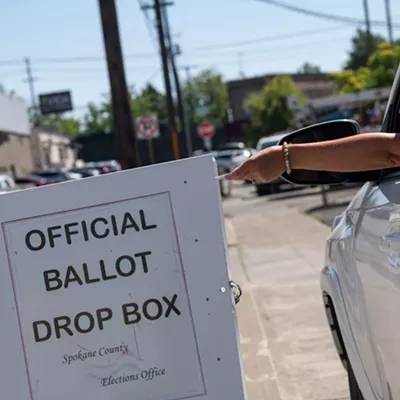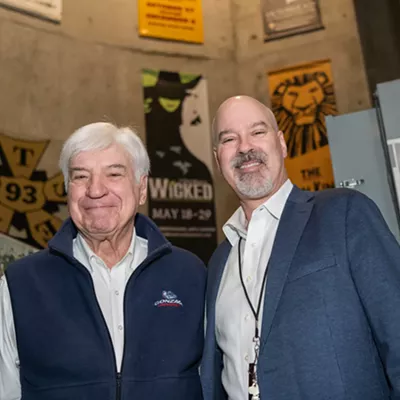Something rare happened last week when news came down that the job of representing Washington's 5th Congressional District was opening up. When Cathy McMorris Rodgers announced she would not be seeking reelection after she completes 10 two-year terms of service, it was something that has not happened much around here. In fact, she's only the fourth person to hold the office since World War II.
History does offer lessons about the character of Eastern Washington: Voters tend to stand by their member of Congress. Walt Horan, Tom Foley, George Nethercutt and McMorris Rodgers were the only ones to hold the seat over the past 82 years, suggesting that the next person could be in line for a long tenure. But history also shows that turnover does come, but only during politically seismic times.
Walt Horan was born in a cabin on the banks of the Columbia River in 1898; he served in the Navy during the big war — World War I, that is. An apple grower from Wenatchee, he became a popular politician by paying attention to his constituents, especially farmers and ranchers. "You can accomplish more in Washington," he once said, "by making friends than by making headlines."
Of course that appears to be the opposite of how things work now, but in 1943 the upheaval of World War II helped him become the first Republican to take the seat in 20 years. (He beat Spokane legends Joe Albi and Clarence Dill in the process.) Horan seemed to be secure in his seat until a big political shift came along, creating the conditions for the kind of sweeping change he'd once benefited from.
In 1964, a young lawyer from Spokane who was working in Sen. Henry Jackson's office in Washington, D.C., was getting a little restless. He decided to run for Congress! He borrowed some money for the filing fee, the story goes, set out for Olympia, running out of gas on the way but making the filing deadline by just 15 minutes. That sliver of time turned into a 30-year adventure that ultimately took him to the highest office in Congress.
Young Tom Foley's timing was impeccable as his longshot candidacy against mighty Walt Horan was powered by one of the biggest landslides in American political history. Fresh off the trauma of the murder of President John Kennedy, Lyndon Johnson's 1964 victory swept Foley and many other first-timers into office.
Foley found out that when you're in the right place at the right time, just ride the wave. But he also learned how, once in office, he needed to take care of business, which he did masterfully, sticking up for the farmers and ranchers of Eastern Washington just like Horan did.
After 15 terms, Foley had become more like a feature of the landscape. The local Republicans had gotten so resigned to losing to Foley that they finally just asked the chairman of the party to run against him. The year was 1994, and that chairman — George Nethercutt — turned out to be just the ticket.
Meanwhile, a tide was rising against Bill and Hillary Clinton, who Tom Foley, then speaker of the House, was inextricably connected to. Ultimately Nethercutt, whose dog was a regular feature of his TV ads, just needed to ride the wave as the race in the 5th District became the focal point of the Republican Revolution and Newt Gingrich's "Contract with America."
Again, a landslide that was more about national issues than Eastern Washington issues brought big changes.
A decade later, it looked like the one-time Spokane attorney Nethercutt had life tenure, but again a national wind blew our way when Karl Rove tapped him on the shoulder. Rove was George W. Bush's political mind, and he wanted to expand the Republican reach even into blue Washington; he kind of volun-told Nethercutt to run against (and lose to) Patty Murray for Senate.
When Nethercutt announced his candidacy — and that he'd be leaving the House — it set off a scramble to fill his seat. One of the most surprising candidates to emerge was the mostly unknown Cathy McMorris, a state legislator from Colville in her mid-30s (like Foley when he ran).
State legislators Todd Mielke and Larry Sheahan also entered the race, along with Spokane County Sheriff Mark Sterk and Spokane attorney Shaun Cross; TV anchor Randy Shaw nearly filed to run. All of the other candidates (Mielke and Sterk dropped out before the primary) had better name recognition than McMorris, but with a three-way vote split, she came through on top. In the general election, she bested the well-funded, accomplished business leader, Democrat Don Barbieri, by 20 points.
So here she is, right where her predecessor was in 2004 — leaving Congress, with a pack of potential candidates wanting her job. Depending on how things play out, could McMorris Rodgers give her preferred replacement a huge, perhaps insurmountable boost with an endorsement? Certainly many within her party will hope she at least waits for the dust to settle before doing anything like that — or that she leave it entirely to voters by staying out of it.
But in light of history showing this now-reliably Republican post only turns over in tumultuous years, could her departure endanger the seat? Washington is very blue, with only two of 10 in the delegation being Republicans. (Neither has completely followed MAGA orthodoxy: Dan Newhouse voted to impeach Donald Trump over his role in the Jan. 6 insurrection, while McMorris Rodgers voted to certify Joe Biden as the winner of the election.)
If Trump is convicted of crimes over the coming months, and if that depresses turnout among Republicans, and if a wild GOP primary results in a weak candidate, and if the Democrats nominate a Foley-type with crossover appeal, the conditions might be ripe.
Thanks to some members' behavior and tight voting margins, Congress is not a very serious place right now, with egos run amok and barely anything getting done. That has to be one of McMorris Rodgers' reasons for leaving — same for so many others who have announced their plans to retire. David Condon worked for McMorris Rodgers in D.C., and part of the reason he left to become mayor of Spokane was that he felt he could do more here than in the other Washington.
So, to all those who are thinking about making a run: You're experiencing a very admirable, quintessentially American impulse. You have public service in your heart, so no matter what happens, bottle up those feelings. If you feel called and qualified, you should run — that's the rawest material of democracy. But understand that, the way things are right now, you could make just as big a difference by focusing on progress here locally as you could in D.C. Either way, Eastern Washington needs your energy and spirit!
Of course one of you will make it to Congress: Please be a force for reforming the institution to its original purpose. It's going to be a big job. ♦
Ted S. McGregor Jr. is the publisher of the Inlander.

























